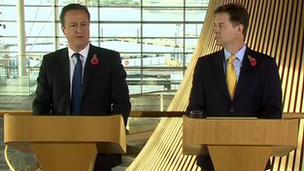A historic week in Wales: a few things to look out for
- Published
- comments

David Cameron and Nick Clegg are expected to discuss Welsh devolution
Another "historic" week beckons in Welsh politics with the imminent arrival of the St David's Day agreement.
David Cameron and Nick Clegg are expected to discuss the details this afternoon. It's expected to be the biggest transfer of powers since the last one. So what should we look out for?
The agreement follows months of cross-party talks led by Welsh Secretary Stephen Crabb, who hopes to deliver what he calls "powers with a purpose" (not to be confused with the Scottish government's "powers for a purpose", external call).
Some areas are easier to predict than others. There appears to be agreement that the National Assembly for Wales should be able to decide its own name, its own rules, how many members it has and who should be able to vote in its elections.
There is cross-party support for the devolution of more energy powers, including fracking. Giving the Welsh government power over larger wind farms may be unpopular with Conservatives in mid Wales but a row with his own party would allow Mr Crabb to claim it demonstrates his cross-party approach.
What won't be devolved? Full devolution of policing and criminal justice looks to be off the agenda, as does welfare. And despite the Scottish government getting more control of income tax, there appears little appetite for Wales to get more than the limited powers devolved (after a referendum) in the Wales Act 2014.
The focus of the cross-party talks has instead been on the recommendations of the second report of the Silk commission on devolution., external
In its evidence to that commission, the UK government suggested two years it could devolve teachers' pay, external but it's unclear whether that has cross-party support.
Hunting? It didn't feature in the Silk Report but the Lib Dems and Plaid Cymru may favour devolution. The Telegraph reported Mr Crabb to be "open-minded and pragmatic" on this , external- but it's an issue on which it's hard to find a consensus within parties let alone between them.
The secretary of state has not had a completely free hand in the negotiations. He has had to broker deals with individual Whitehall departments - such as the Department for Energy and Climate Change or the Treasury - before he can agree to give powers away.
Mr Crabb may have been hoping to proceed on the basis of a cross-party consensus, but it won't have escaped the notice of parties outside government (or the Liberal Democrats) that details are scheduled to be published at the Welsh Conservative conference in Cardiff on Friday.
For all the talk about powers, it's always worth remembering that advice from All The President's Men: follow the money.
The Tories hope Treasury agreement to a new deal on the way Wales is funded will prevent Labour being able to use the lack of "fair funding" as an excuse to avoid the Welsh government taking responsibility for setting income tax rates. (A referendum would still, it appears, be required).
But the devil will be in the detail. Ed Miliband said last week Labour would ensure "a fair funding settlement for Wales", external but stopped short of saying how much actual cash this would involve.
So will Stephen Crabb's deal with the Treasury go beyond the warm words about "Barnett floors", external we have heard before and involve real money? Will he get George Osborne's cheque book out in a way that truly outflanks the other parties? Plaid Cymru, for one, are preparing their "disappointed" press release.
Mr Crabb may have been talked of "a cross-party consensus on a way forward for Welsh devolution", but it won't have escaped the notice of parties outside government (or the Liberal Democrats) that details are scheduled to be published at the Welsh Conservative conference in Cardiff on Friday.